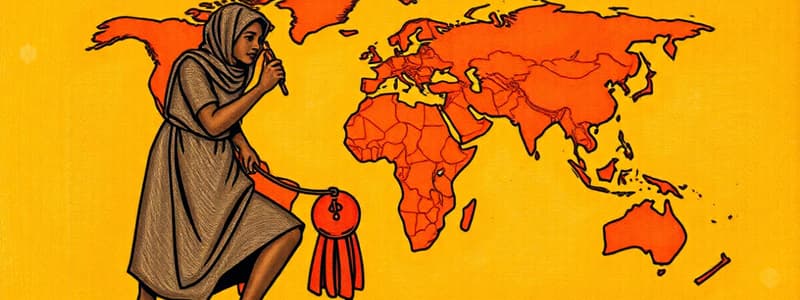Podcast
Questions and Answers
What is the primary focus of contemporary development studies?
What is the primary focus of contemporary development studies?
- Developing countries (correct)
- Urban development
- Developed countries
- Global globalization
Sustainability focuses on meeting future needs without compromising current needs.
Sustainability focuses on meeting future needs without compromising current needs.
False (B)
What does the Human Development Index (HDI) measure?
What does the Human Development Index (HDI) measure?
Life expectancy, education, and per capita income
The __________ Theory argues that developing countries are dependent on developed countries.
The __________ Theory argues that developing countries are dependent on developed countries.
Match the following key issues with their descriptions:
Match the following key issues with their descriptions:
Which of the following is a key concept in contemporary development studies?
Which of the following is a key concept in contemporary development studies?
Postcolonial theory focuses on understanding global issues without considering historical contexts.
Postcolonial theory focuses on understanding global issues without considering historical contexts.
What is the role of international organizations in development?
What is the role of international organizations in development?
Flashcards are hidden until you start studying
Study Notes
Contemporary Development Studies
-
Definition and Scope:
- Interdisciplinary field analyzing social, economic, and political changes globally.
- Focuses on developing countries and the processes of development.
-
Key Concepts:
- Sustainability: Emphasizes meeting current needs without compromising future generations.
- Globalization: Examines the impact of worldwide interconnectedness on local development.
- Inequality: Studies disparities in wealth, access to resources, and opportunities.
-
Theoretical Frameworks:
- Modernization Theory: Proposes that development follows a linear path from traditional to modern societies.
- Dependency Theory: Argues that developing countries are dependent on developed countries, perpetuating inequality.
- Postcolonial Theory: Focuses on the legacy of colonialism and its impact on contemporary development.
-
Key Issues:
- Poverty Reduction: Strategies and policies aimed at alleviating poverty.
- Gender Equality: Importance of empowering women for sustainable development.
- Environmental Challenges: Addressing climate change, resource depletion, and pollution.
-
Development Indicators:
- Human Development Index (HDI): Measures life expectancy, education, and per capita income.
- Gender Inequality Index (GII): Assesses inequality between genders in terms of reproductive health, empowerment, and labor market participation.
- Sustainable Development Goals (SDGs): UN goals that address global challenges by 2030.
-
Approaches to Development:
- Participatory Development: Involves local communities in the planning and implementation of development projects.
- Integrated Development: Combines economic, social, and environmental strategies for holistic improvement.
- Bottom-Up vs. Top-Down: Contrasting approaches in project implementation and policy-making.
-
Institutions and Actors:
- International Organizations: Such as the UN, World Bank, and IMF play roles in funding and policy guidance.
- Non-Governmental Organizations (NGOs): Engage in grassroots development and advocacy.
- National Governments: Formulate policies and strategies for national development.
-
Emerging Trends:
- Digital Development: Impact of technology and digital infrastructure on economic growth.
- Social Entrepreneurship: Innovative ventures aimed at solving social issues.
- Resilience Building: Preparing communities to withstand economic and environmental shocks.
-
Challenges:
- Corruption: Hinders effective development and resource allocation.
- Political Instability: Affects the consistency and sustainability of development efforts.
- Global Health Crises: Situations such as pandemics impact development priorities and resources.
Definition and Scope
- Development Studies is an interdisciplinary field analyzing how social, economic, and political changes happen globally. It focuses on developing countries and the processes of development.
Key Concepts
- Sustainability: Emphasize meeting today's needs while protecting resources for future generations.
- Globalization: Examines the impact of worldwide interconnectedness on localized development.
- Inequality: Analyzes disparities in access to wealth, resources, and opportunities.
Theoretical Frameworks
- Modernization Theory: Suggests that development happens in progression from traditional to modern societies following a linear path.
- Dependency Theory: Argues that developing nations are dependent on developed nations, perpetuating inequality.
- Postcolonial Theory: Emphasizes the lasting influence of colonialism on contemporary development.
Key Issues
- Poverty Reduction: Strategies and policies targeted at reducing poverty levels.
- Gender Equality: Empowering women drives sustainable development.
- Environmental Challenges: Addressing issues like climate change, resource depletion, and pollution.
Development Indicators
- Human Development Index (HDI): Measures life expectancy, education, and per capita income to quantify human development.
- Gender Inequality Index (GII): Assesses inequality between genders based on reproductive health, empowerment, and labor market participation.
- Sustainable Development Goals (SDGs): UN goals aimed at tackling global challenges by 2030.
Approaches to Development
- Participatory Development: Involves local communities in the planning and execution of development projects.
- Integrated Development: Combines social, economic, and environmental strategies for comprehensive improvements.
- Bottom-Up vs. Top-Down: Contrasting approaches in project implementation and policy-making, emphasizing community involvement versus centrally directed approaches.
Institutions and Actors
- International Organizations: Organizations like the UN, World Bank, and IMF play a role in funding and policy guidance for development.
- Non-Governmental Organizations (NGOs): Engage in grassroots development and advocacy.
- National Governments: Formulate policies and strategies for national development.
Emerging Trends
- Digital Development: The impact of technology and digital infrastructure on economic growth.
- Social Entrepreneurship: Innovative ventures aimed at solving social issues and promoting development.
- Resilience Building: Preparing communities to withstand economic and environmental shocks.
Challenges
- Corruption: Hinders effective development and the allocation of resources.
- Political Instability: Affects the consistency and sustainability of development efforts.
- Global Health Crises: Situations like pandemics impact development priorities and resources.
Studying That Suits You
Use AI to generate personalized quizzes and flashcards to suit your learning preferences.




